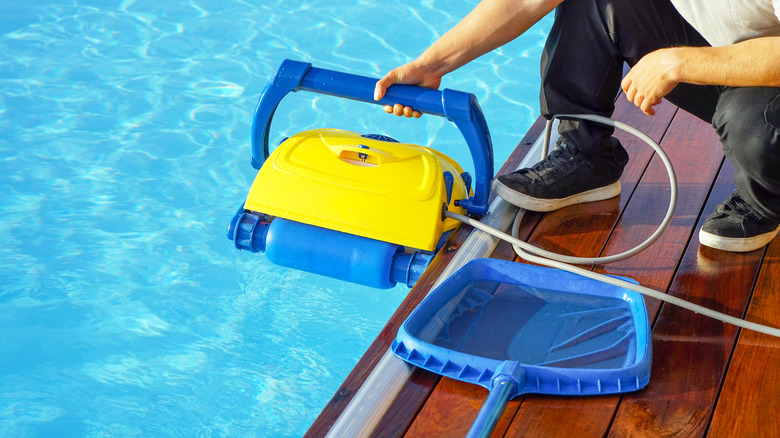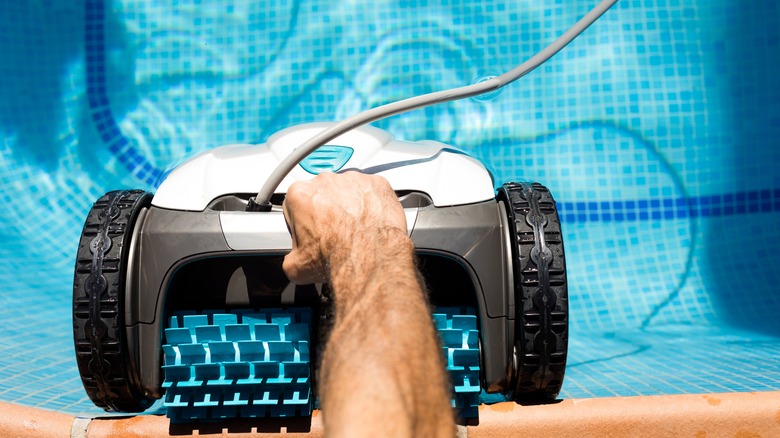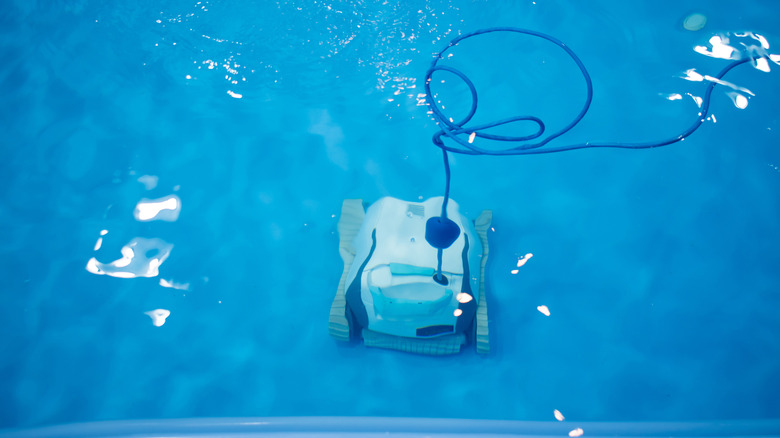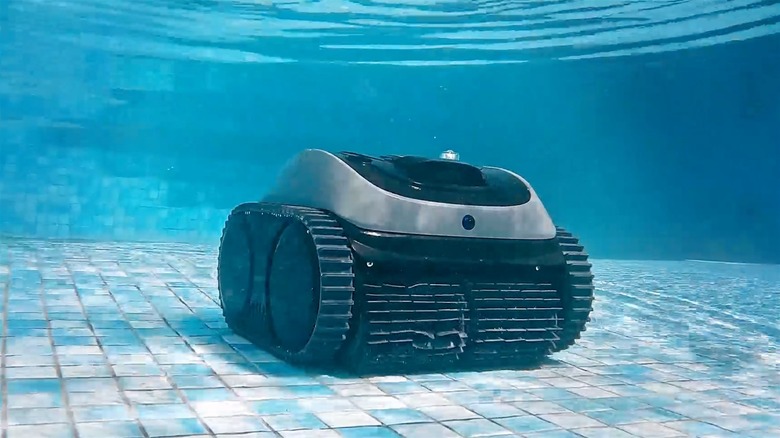Are Robotic Pool Cleaners Worth It?
We may receive a commission on purchases made from links.
Having a backyard pool is great, but before it can be enjoyed, there's maintenance required. Not cleaning your pool regularly can lead to a buildup of debris and bacteria that could make you sick when you swim, but you most likely wouldn't want to jump in the unsightly water anyways. Some people try to clean their pool themselves, while others hire a professional cleaning service that sets up a maintenance schedule. However, there's also another option, and it's a robotic pool cleaner. This is a machine that moves across the bottom surface, performing automatic cleaning tasks. It's like an indoor robot vacuum but for the pool.
Because these machines are expensive, you may be wondering if they're worth the price. Although they don't make the pool a perfectly sparkling gem on their own, they reduce the amount of work you need to do yourself — but they also have some drawbacks that can cause hassles. Ultimately, deciding whether a robotic pool cleaner is right for you depends in large part on how much time you spend cleaning now. If you find that you're not enjoying your pool as much because of the cleaning requirements or you feel like you're spending far too much money on a professional service, the robot can give you more free time and possibly save you money. Consider all the pros and cons of robotic pool cleaners, as well as some of their smart technology features, before deciding if they're worth the price for you.
Advantages to using robotic pool cleaners
One of the mistakes everyone makes when buying a pool is not knowing how much maintenance is required to keep them clean. Fortunately, robotic pool cleaners can reduce the amount of time you need to spend on manual cleaning and maintenance work. They typically have powerful brushes that efficiently pull debris from the bottom. Additionally, if you have algae forming, the robotic scrubbers will pull this material loose and suction it up. Not only that, but they can also filter and circulate the water, leading to an overall cleaner pool.
These devices are also typically easy to use, as all you'll need to do is turn them on and place them in your pool — they should be able to handle the rest. This is great news for those who previously cleaned their pool themselves. Further, those who used to hire someone to clean their pool may find that these devices save them money over time, even though they can be pricey upfront. Some are considered to be energy efficient, which could lead to increased savings as well.
Finally, they typically have a pretty short cleaning cycle that takes about one to three hours. After this time, they need to be removed from the water until the next cleaning cycle. This leaves plenty of time for swimming without having to dodge the hoses and cords that are usually involved with robotic pool cleaners.
Disadvantages of robotic pool cleaners
Even though these machines have quite a few advantages, there's no getting around the fact that robotic pool cleaners are expensive. The cheapest options, which are typically used in above ground pools that don't need wall cleaning, cost about $300, while the top-of-the-line models for in-ground pools may be priced near $2,000. This is no small investment, so it's important to understand some of the potential drawbacks beforehand. To begin, like any machine, it's highly likely that it will break down at some point, and not just anyone can repair a robotic pool cleaner. The process of fixing your device may be inconvenient.
Another disadvantage is that they do not remove debris that floats on the water. This means that you'll still see signs that your pool is in dire need of a cleaning and have to skim the surface of the water. Additionally, these devices shouldn't be left in the pool at all times. Once they've completed their cleaning cycle, they need to be removed to avoid damage from chlorine and other pool chemicals. This could be a hassle.
The robot's cord could get tangled, which would be frustrating. Finally, if the pool is neglected for some time, the tracks and wheels on the machine could become jammed with debris. You would then have to unclog the wheels and clean the bottom manually to remove the problematic layer of unwanted debris, which would defeat the purpose of making caring for your pool easier.
Smart technology and robotic pool cleaners
Even with these drawbacks, robotic pool cleaners can be helpful tools. If you think they're worth the money, consider all the modern features available. While models with smart technology will cost more than basic types, the convenience may be worth the initial investment. For instance, many robotic pool cleaners can be controlled by an app on your smartphone. This allows you to make a cleaning schedule, where your device automatically cleans at certain times. This could be helpful if you were out of town but wanted to come home to a spotless pool. Another benefit of an app is that it can update you when a cleaning cycle is done and the device needs to be removed from the pool. Furthermore, you can also sometimes control your device right from your phone.
Some robotic pool cleaners also come with multiple cleaning modes, such as a fast option or deep clean, that allow you to pick the right mode depending on how much time you have or how dirty your pool is. There are also cordless robotic pool cleaners available, which come with a charging station and eliminate the hassles that come with cords getting tangled or not being long enough. Finally, some devices can be programmed to follow a cleaning pattern based on a map of your specific pool, making them more efficient. Some can also clean the walls even above the waterline, ensuring that your entire pool is as spick-and-span as possible.



